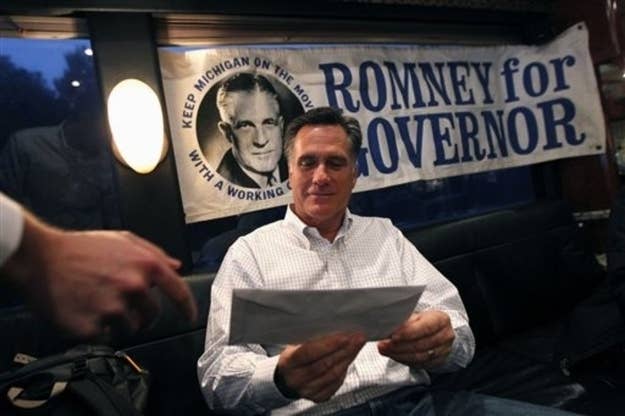
When Mitt Romney runs for president, the only glimpse of the candidate in a Mormon church setting comes from an enterprising reporter who seeks out the chapel near his vacation home.
When his father, George, ran, he invited the entire press corps to hear his sermon at a Sunday service.
The contrast between how the two men publicly approach their faith came into clear focus Monday, after The AP's Kasie Hunt visited the Mormon ward in New Hampshire that the Romneys attend on vacation, and published a widely-circulated story advertising a "rare glimpse into his practice of a faith that has permeated every aspect of Romney's life." The article describes Romney chatting with congregants, singing hymns, and feeding dry cereal to a restless toddler during the service.
There were no groundbreaking revelations, but the story quickly grabbed the attention of the chattering class, who felt like they were getting an secret look at Romney in his most intimate, guarded setting. As Hunt notes, the candidate almost never mentions his religion, and his aides have made efforts to keep press away from the LDS services he attends on the campaign trail.
The reluctance to open his religious life up to public scrutiny coincides with the careful, risk-averse strategy Romney's campaign has become known for. It is also largely at odds with the way his father — both a role model, and a cautionary tale to the nominee — approached the subject during his presidential bid.
In their 1967 book The Republican Establishment, David S. Broder and Stephen Hess write that George Romney essentially kicked off his candidacy by inviting 40 traveling reporters to attend a Sunday morning church service in Anchorage, Alaska, during which he and his wife were scheduled to deliver sermons.
On Sunday morning, reporters, awakened early by the Romney staff, rubbed the sleep from their eyes and noticed on the mimeo-graphed schedule that the only event preceding the fight back to Seattle was listed as: 8 a.m. Alaska Standard Time. Governor and Mrs. Romney attend LDS Stake Priesthood Service...
The Romneys were escorted to the platform; the reporters, a bit self-conscious in the strange surroundings, to a front pew. The opening hymn was spirited; George and Lenore, a handsome couple, sang with gusto about the day "when all that was promised the Saints would be given."
The account goes on to describe Mrs. Romney delivering a brief, but well-received talk about the moral decay of the nation, how America's success would depend on its adherence to the teachings of Jesus Christ, and a lament for the "Negro mothers raising children in the slums."
George Romney was even more blunt about how his religion informed his political views, sermonizing against "racial discrimination," but then quoting the Mormon book of scripture Doctrine and Covenants to hedge his controversially progressive views.
"[Can] the urgent need to correct social injustice justify defiance of law? I believe personally that God has given a very clear statement on this point," he said, quoting a verse: "Let no man break the laws of the land. For he that keepeth the law of God hath no need to break the laws of the land." He concluded: "We must deal with social injustice with respect for law. We must do both."
The younger Romney has studiously avoided implying any intersection between his religious beliefs and his political positions — and, in fact, has avoided religion altogether on the stump.
And as the most famous Mormon in the world, Romney's guardedness has lead to misperceptions that the church itself is utterly closed to outsiders — a notion officials at the church, an intensely evangelical institution, have worked hard to correct. Church spokespeople frequently stress the difference to journalists between the 18,000 chapels around the world that welome visitors (and, they hope, converts), and the 139 temples, which are closed Sundays and are used to perform sacred ordinances only available to faithful members.
"We invite anyone who wants to attend a worship service to join us," said Church spokesman Lyman Kirkland. "Through various means, such as press materials and websites, the Church has made an effort to help the public understand that we invite all to our chapels."
Mitt Romney, unlike his father, has no apparent interest in helping to broadcast that message. He is also, however, operating in a different political time. Hess and Broder wrote in 1967 that the election of the Catholic John F. Kennedy had settled the question of whether Americans would accept minority faiths — an observation that seems, at least, premature, in the wake of a contemporary Evangelical revival they could not have forseen.
George Romney, however, operated in the climate of that conventional wisdom, once telling the New York Times, "I am completely the product of the Church of Jesus Christ of Latter-day Saints."
